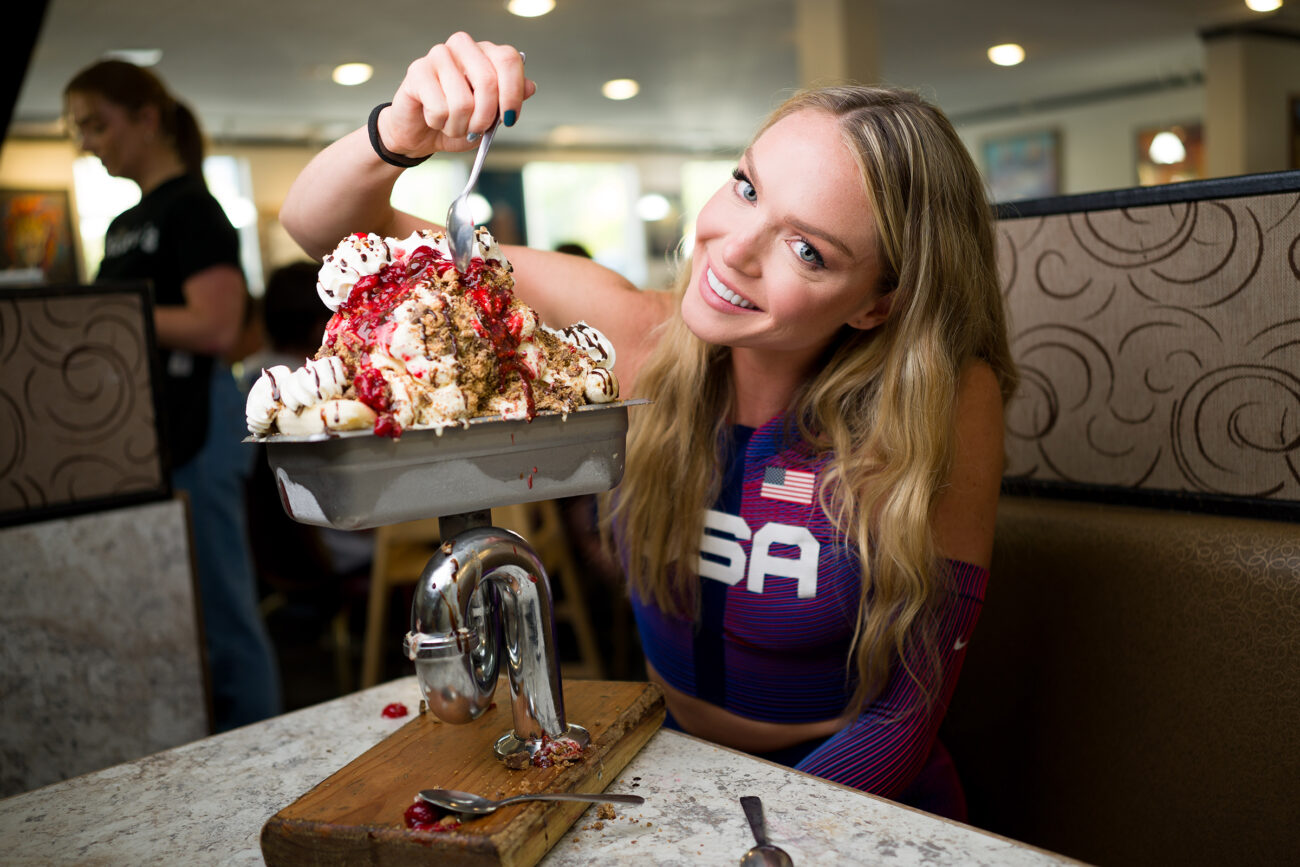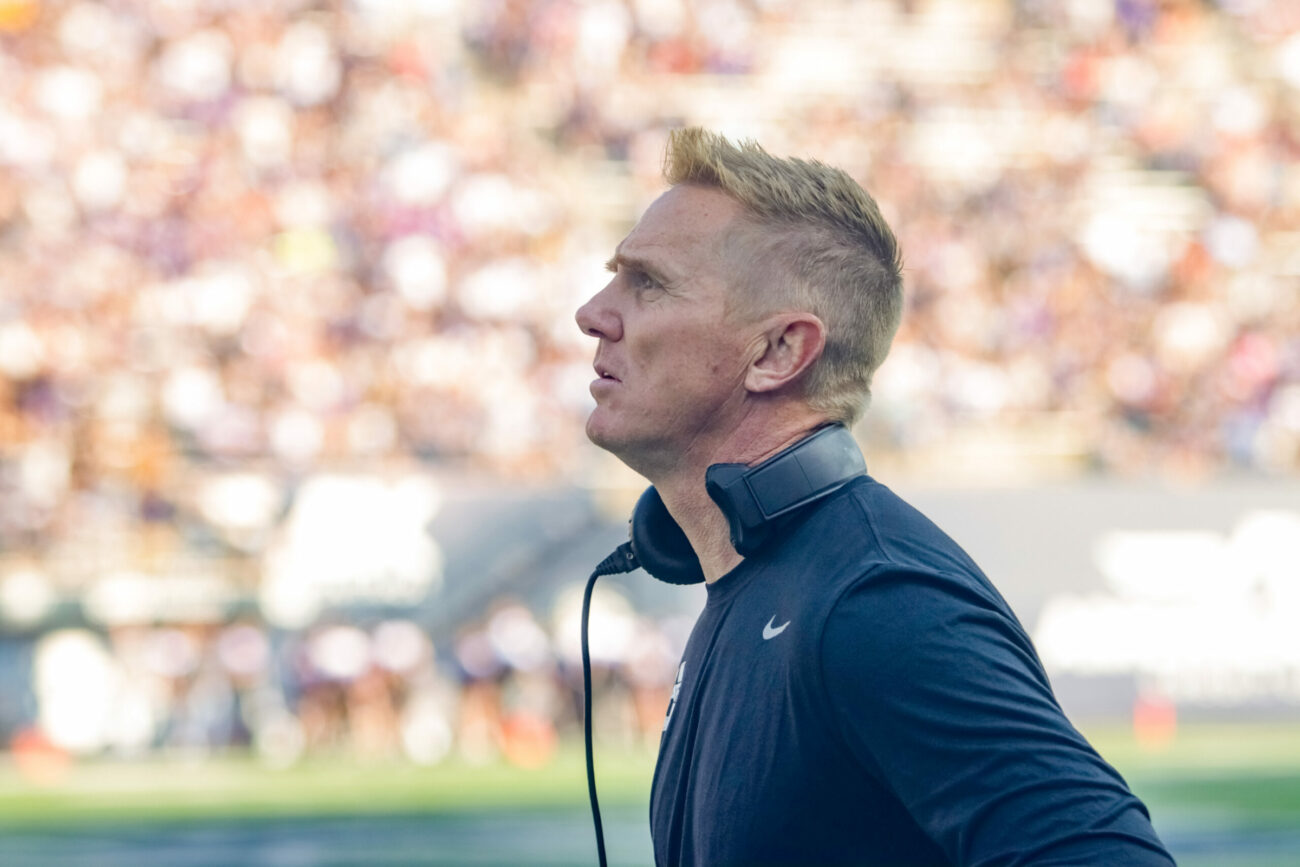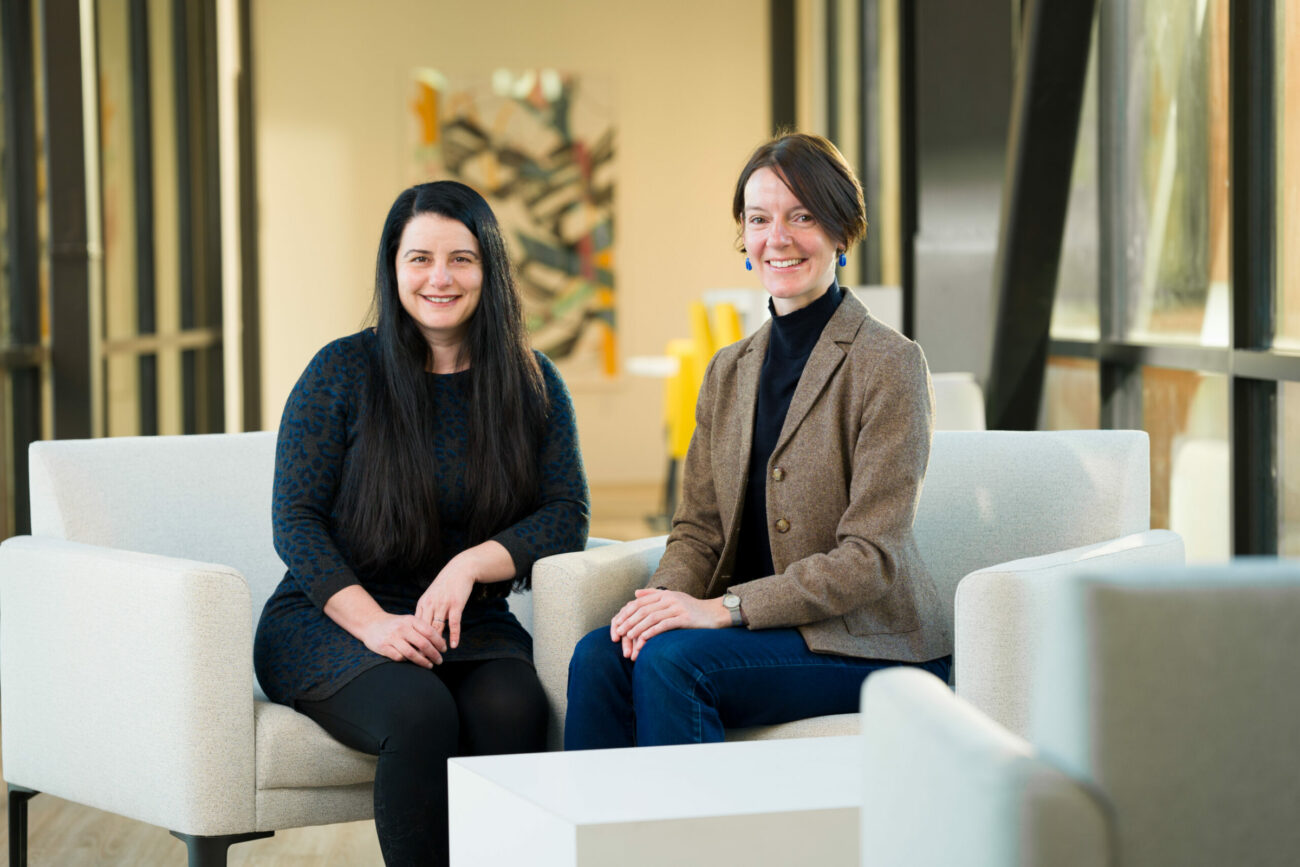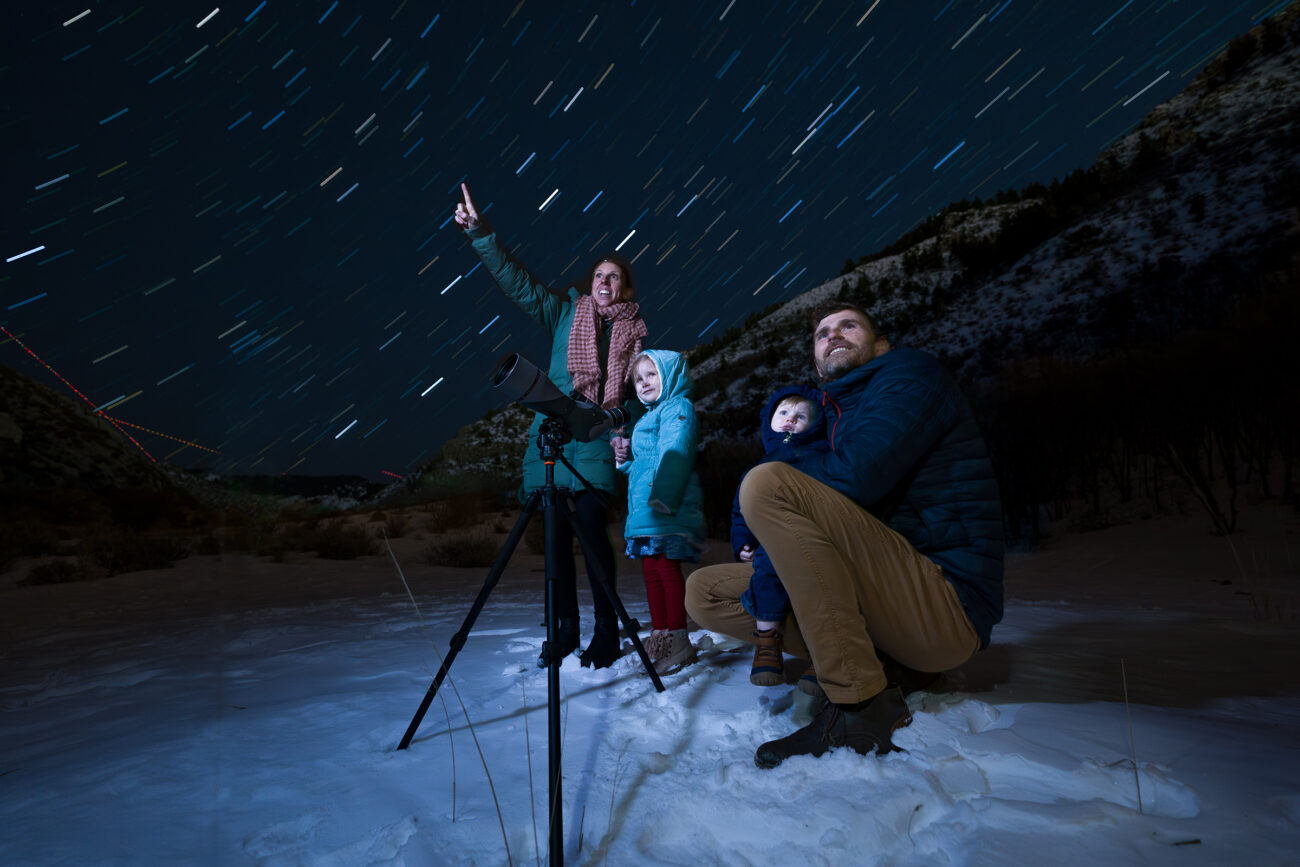Connecting During COVID-19
When James Rencher arrived at Utah State University in August, he didn’t know any of his roommates.
As a freshman from Helena, Montana, he also didn’t have many people from his hometown attending school in Logan, Utah. While he hadn’t experienced issues making friends before, restrictions related
to the COVID-19 pandemic made making friends more difficult.
“It’s harder to branch out,” he says. “If I see someone else sitting alone at lunch, I’ll be like, ‘Hey, can I sit here and talk?’ A lot of times, people will be like
‘No.’”
He has found it difficult to determine how comfortable people feel with social interaction during a pandemic, resulting in occasional rejections.
Rencher bonded with his roommate by watching Narcos on Netflix at the beginning of the semester. However, he still sought other ways to get to know fellow students. He signed up for multiple clubs ranging from interests in running to politics. Rencher went to outdoor locations like the Living Learning Community’s fire pit to meet people. Occasionally, he joined a group that played video games in a common area of his residence hall.
Thanks to his perseverance, Rencher now enjoys the company and support of a close-knit group of new friends. He’s also managed a date during his first semester. One girl had seen him around and asked for his Snapchat. After chatting online for a bit, they went on an ice cream date at Arctic Circle, masks in tow.
Making the Connections
Meanwhile, freshman Ella Olsen, of Minneapolis and Anders Gilvear, a transfer student from Bountiful, Utah, started a relationship amidst the pandemic. They, too, attribute their new friendships to the fire pit outside the LLC residence halls. After meeting a few people there at the beginning of the semester, Gilvear invited some attendees to a small movie night. Olsen came to the gathering, where they watched a John Mulaney comedy special, and the duo started dating shortly afterward. As a couple, they enjoy socially distanced activities like hammocking, homework on the Quad, and axe throwing.
“I think meeting new people is the hardest part of it all,” Gilvear says. “But once you make that connection, then meeting up with them again is a lot easier.”
One way they’ve found to be social in a world of online classes and video-conference lectures is utilizing the chat function in Zoom because it’s the only way to socialize in classes. This might be easier than talking to people in person, according to Gilvear.
“I never realized how much lipreading assisted hearing until everybody started wearing masks. I can only catch every other word,” he says.
Like Rencher, Olsen and Gilvear tend to hang out with the same, small group of friends. This is partly an effort to control who they come in contact with if they were to test positive for COVID-19. Olsen had to be quarantined and tested early in the semester following a breakout at the LLC and wants to keep others from having to do the same.
“I’m not that worried about myself because I think I’ll be fine. It’s just everyone else that I was around; I don’t want them to have to quarantine and then have them have to tell other people, ‘My friend tested positive. You might need to quarantine,’” she says.
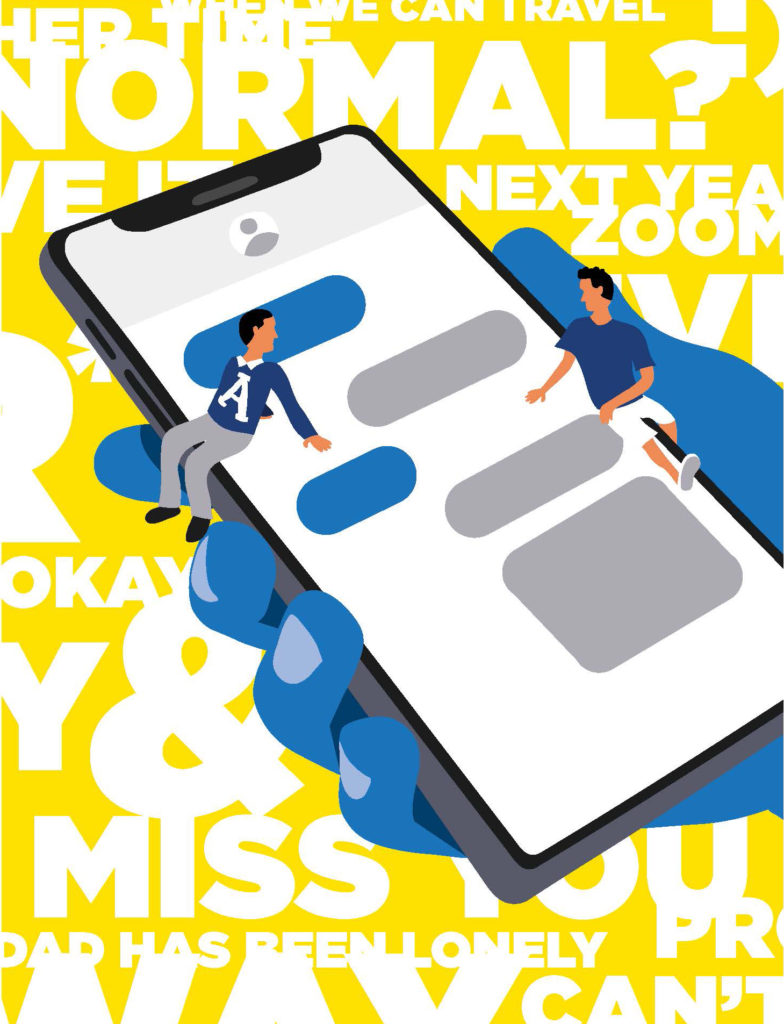
In addition to the usual anxieties of getting to know someone you find attractive, there are now added uncertainties. Is the other person comfortable going to a restaurant? Are they okay with holding hands or kissing? Would they rather communicate digitally than in person?
Illustration by Emeline Huntsman
Humphries ’18.
Disrupted Norms
While the pandemic continues to spread illness and lockdowns uproot economies, one area often neglected is how it affects emotional and mental health, especially among students.
“All of us are born with three essential human needs and they’re the needs for safety, satisfaction, and connection,” says Dave Schramm, professor of family life and USU Extension specialist. “You think about what COVID-19 has done recently, and it’s really knocked out all three of those.”
Not only has the pandemic affected physical safety but also mental and emotional safety. It has also limited activities that many normally use to find satisfaction, like going to the movies or traveling. Connection has also been limited by precautions like social distancing.
Dr. Stacy Gerberich, psychologist with USU Counseling and Psychological Services, the on-campus counseling and mental health center, says we have a need for connection in our DNA. “As human beings, we are mammals and mammals are community-based creatures. Connection is hardwired into our brains.”
For college students, these connections often come via hanging out with friends, dating, through participation in clubs, study groups, and jobs. With safety guidelines and restrictions, however, traditional social activities have been limited and social norms are often abnormal. Many clubs meet exclusively online. Some events, like the Day on the Quad, were canceled altogether.
Dating can be difficult during this time, too. In addition to the usual anxieties of getting to know someone you find attractive, there are now added uncertainties. Is the other person comfortable going to a restaurant? Are they okay with holding hands or kissing? Would they rather communicate digitally than in person? The pandemic has introduced a new level of consent and conversation centered around COVID-19 safety. While important, this can introduce an additional barrier to pursuing a relationship.
“As human beings, we are mammals and mammals are community-based creatures. Connection is hardwired into our brains.” – Stacy Gerberich
The fulfillment of safety, satisfaction, and connection needs is crucial and connected to mental health. According to Gerberich, connection and belonging within a community can buffer against presentation of symptoms for mental illnesses like anxiety, depression, or bipolar disorder.
Because university students tend to have increased stress levels anyway, additional stress from the pandemic and lack of social connection can be tricky to navigate. This stress can be heightened for those who are deemed “essential workers,” which many college students are. According to a study conducted in Switzerland this year, college students had higher levels of depression, anxiety, and stress in April, shortly after the pandemic and lockdowns had begun in the country.
Heightened stress levels not only affect a student’s schoolwork, but also family life and other relationships. Humans do not live compartmentalized lives. What happens in one area of life can and often will affect other areas. In psychology, this is known as the spillover effect. As such, it’s important for people to seek ways to fulfill these needs, even when it’s complicated to do so.
Finding Silver Linings
Socialization and connection during a pandemic requires thinking outside of the box and students “may have to push themselves a little bit out of their comfort zones,” Schramm says.
There may be awkward situations, but it will take time and work to adjust, Gerberich admits. “It’s almost like we’re all doing this cultural adjustment to these new social norms and no one really knows what the social norms are supposed to be. Don’t give up. It can be disheartening and discouraging when you’ve tried a couple things and it’s not working.”
Using digital tools is another way many students have found to connect.
“Technology often gets a bad rap, in that it sucks our time,” Schramm says. “But, really, it was a huge go-to and really a savior in many ways through Zoom and this technology that has allowed us to connect. Even a decade ago, if this were to happen, I think the effects would have been worse.”
Many students are turning to online formats to meet new people. In a study by Dating.com in early March, 82% of singles reported turning to online dating to improve health and wellness. A survey administered by American Campus Communities shows that up to 87% of American students are using technology to stay connected while isolated. Match Group, which owns services like Tinder, Match, and OkCupid, reported an 11% increase in paying subscribers during second quarter compared to the previous year. Meanwhile, Mutual, a dating app popular among students who are members of the Church of Jesus Christ of Latter-day Saints, reports it has seen a 16% increase in users since March.
“I know a lot more people are on dating apps like Mutual and Tinder,” Rencher says.
For fun, he and his friends created a group account on Tinder. Rather than posting an individual photo, they uploaded a group photo. When they match with other users, they send a list of their names so the other person can let them know who they are most interested in.
Events and activities have continued to proceed at USU, albeit a little different. These activities have been a main way through which students are interacting amidst coronavirus restrictions like masks. Every evening when it is warm enough, the Legacy Fields and courts near the Aggie Recreation Center fill with students playing soccer, softball, and ultimate frisbee. During the first half of the semester, the Caine College of the Arts hosted concerts on the Engineering Quad underneath a large tent every Wednesday. The Howl, known as the biggest Halloween party in Utah, was separated into smaller, socially distant events like a drive-in movie at Maverik Stadium or scavenger hunt.
“Anything really worthwhile, worth doing, is going to take some effort and perhaps, they come out of this stronger because they’ve developed new skills. Try to lean in and say, ‘Okay, how can I benefit from this?’” – David Schramm
“This year, event planning has been challenging but rewarding. It takes a lot more time and effort to ensure that we are providing events for our students while still making sure they are safe to attend,” says Alexis Needleman, this year’s USUSA activities director. While there have been difficulties, she says, Needleman is grateful for the opportunity to give back to Aggies during the pandemic.
Students have also taken dating outdoors, with more dates navigating corn mazes, hiking, miniature golfing, or sitting around campfires. Whether through school-sponsored activities or on their own, students are finding ways to socialize despite COVID-19 restrictions.
“Anything really worthwhile, worth doing, is going to take some effort and perhaps, they come out of this stronger because they’ve developed new skills,” Schramm says. “Try to lean in and say, ‘Okay, how can I benefit from this?’”
While navigating the new space of connection during COVID-19 can be challenging, Gerberich says that people are becoming aware of how important connection is. “That’s always a good thing when you realize what’s important.”
Despite hardships, Rencher is seeing the silver linings with his current situation.
“I’ve made some pretty good friends here, honestly, and I think, just because of COVID, the people that you do find, you latch onto. You’re forced to make them your buddies,” he says. “I’m really close to them. We do everything together.”
By Alek Nelson ’21
Alek Nelson is a senior at USU and the managing editor for the Utah Statesman. He will graduate in the spring with a degree in journalism and public relations. You can find his work at www.aleknelson.com.
With COVID-19 adding additional emotional and psychological stressors to students, Utah State is focused on offering mental health and wellness preventative services, with workshops and support groups that are open to anyone affiliated with USU on any campus through USU Counseling and Psychological Services. Visit aggiewellness.usu.edu for information about services near you.



